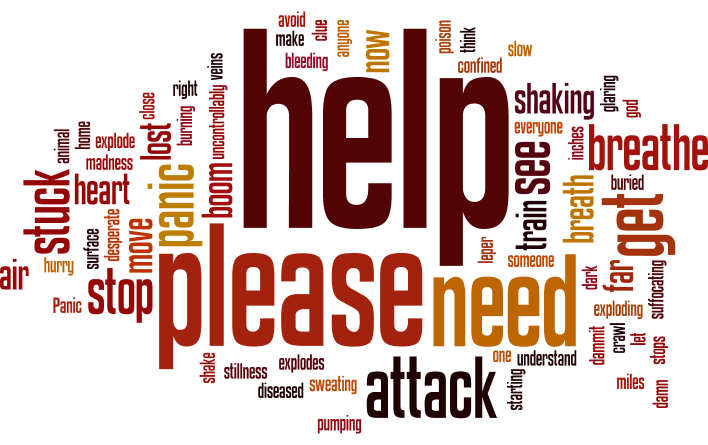Panic Attack: Do’s and Don’ts

Panic Attacks…they suck
If you’ve ever seen someone have a panic attack, you may not have known what to do (turns out most people do not). That’s completely normal. Witnessing a panic attack will most likely catch you off guard, completely unprepared, feeling as if there is nothing you can do to help. But there is.
Defining panic attacks
So what exactly is a panic attack? Is a panic attack different from an anxiety attack? The short answer is that it is an anxiety attack is an extreme reaction to a stressor, and its duration is often tied to the stressor as well (once the stressor is gone, the attack subsides). A panic attack, on the other hand, does not need a stressor to be induced, and because of that, it may not be as short-lived as an anxiety attack (since there is no stressor to get rid of). They carry similar physical symptoms, racing heart, shortness of breath, extreme fear or terror, etc. so they may look similar on the outset, but it is important to know the difference. 
Example: If being in a grocery store is causing someone to have an anxiety attack (they get nauseous, can’t breathe, …), you may be able to help them out of the grocery store, removing the stressor. If you are at a friend’s house and someone starts breathing heavily, body getting tense, feels extremely hot (or cold, depending on the person), they may be having a panic attack and there may be no way to easily “snap them out of it”. This is where I want to focus. Here are some quick “do’s and don’ts” if you find yourself in that situation. You may think something as harmless as a calming touch on the shoulder is helpful, but you may be in for a surprise. Then, I want to share with you what a panic attack looks like in the word of Alex (that’s me).
Do’s and Don’ts
First, let me share a list of some “do’s and don’ts”. These are general guidelines, and will not apply to every situation. Everyone is different.
| DO | DON’T | |
|---|---|---|
| For Starters | Be patient, sensitive, and soft. It’s a scary thing to go through a panic attack. But being a soothing presence, we have the chance to feel that warmth. | Don’t freak out. It is likely that this person has experienced panic attacks before. While it doesn’t make it any easier to work through, necessarily, the person likely knows it will pass. Gently remind them of this, in a calm and soothing voice. |
| Breathe | Breathe with the person - keeping a steady, consistent pace. Help them remember that this will pass; that they should keep breathing and that they will get through it. | Don’t tell the person to “just relax” without being willing to work them through the attack. It seems easy enough to realize that the perceived terror is irrational, but that’s where you’d be wrong. It isn’t an intellectual challenge, it’s an emotional (and chemical) one. So be patient and be willing to help your friend slow down his or her breathing. |
| Ask about Touch | Ask if you have permission to touch their shoulder/back/hand. If you are able to establish touch, this is a huge step in the calming process. | Don’t assume physical contact will calm them down right away. Often, the person is so over-sensitized that touch can feel like a serious threat, when the personal already may feel extreme fear or apprehension. So don’t go in for the “hand on the shoulder” until you have permission to do so. |
| Listen | Be cognizant of the person’s needs. They may change. They may be freezing cold one second, then burning up the next. Be flexible and work with them. Listen. | Don’t assume that you have any clue what they are going through. Everyone experiences panic attacks differently. My panic attacks won’t be exactly like yours. And that means everyone needs something unique. Don’t assume you know what that person needs. Listen to them, instead. |
| Be Present | Ask if we’re ok and if you can get us anything, a glass of water, perhaps. Ask if we want you to stick around for a little or not. | Don’t judge the person, not during, not after. More often than not, there is a severe sense of shame associated with having a panic attack. Don’t make us feel worse than we already do. Don’t try to immediately dig into the root cause of what may have been at the genesis of the attack. Now isn’t the time. It’s most important that we have a period to recover. It’s exhausting. |
A panic attack in the world of Alex
So this is where we get personal. I have panic attacks. I don’t always know what sets them off. Things like being in an overcrowded mall will make me anxious, sure, but they won’t toss me into an attack (that would be an anxiety attack). Most of my attacks happen when I am safe at home and often times don’t seem to have any stressor (panic attack). One of the scary things about panic attacks is that you feel them coming on. This can actually lead to an attack, itself, which sucks. This is called “anticipatory anxiety”, anxiety related to the fear of having an attack.
I experience a number of the common symptoms of a panic attack, but not others. When I have a panic attack, I feel:
- Heart racing
- Sweating
- Extreme tension in my muscles (typically my left bicep and triceps and my quads)
- Shaking, due to the tension
- Curling up in a tight little ball
- Rapid breathing, which can lead to hyperventilation
Not fun. I am usually very cognitively “with it” when I have an attack, however. Normally, I am just upset with myself for being in this situation as if I have magical control over my body’s chemicals (which I usually don’t). I say things like, “Come on Alex, this is ridiculous,” (I know I said not to judge), or “Why can’t I just get rid of the tension?” Safety isn’t the concern. I know that I’m safe and that I have no reason to panic, but my body believes otherwise, and my body wins out over my rational mind. I don’t feel that I’m going to die, or that I’m going to have a heart attack. No. I feel an utter loss of bodily control, with what appears to be a sound mind. How frustrating.
Mine tend to last anywhere between 12 and 20 minutes. It feels like they last forever, but that clearly isn’t the case. In a previous article, I talk about some of the things that help me when I’m having a panic attack. But again, everyone is different. My goal is for you to walk away from this article knowing just a little bit more about panic attacks, and some things you can do if you happen to witness someone experiencing one.
Do you feel like we’ve achieved that goal today? Send me a note and let me know.





